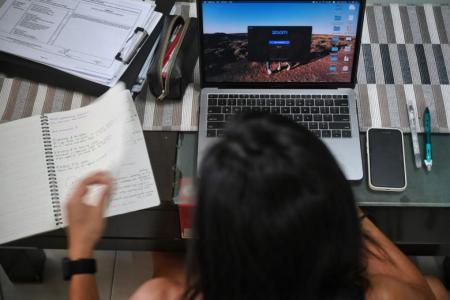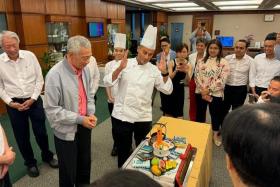MOM to help guide firms with work from home plans, rather than rushing into laws
Work-from-home arrangements are expected to become a more mainstream option for the workforce here, but the Ministry of Manpower (MOM) should not rush into laws that regulate such arrangements, said Minister of State for Manpower Gan Siow Huang on Tuesday (Jan 11).
She said in Parliament: "The majority of employers said that they would allow their workers to continue to work from home for at least a quarter of the time.
"We should not rush into hasty legislation that creates workplace rigidity and impede our economic recovery."
In 2020, three in four employees worked in firms that provided some form of remote working, she added.
The number of workers with access to such flexible arrangements has also increased over the years even before the pandemic, with 53 per cent of employers offering at least one formal flexible arrangement on a regular and sustained basis in 2019, up from 47 per cent in 2018, she said.
She was responding to questions from Mr Yip Hon Weng (Yio Chu Kang) and Mr Louis Ng (Nee Soon GRC), who asked about work-from-home laws.
Legislation may not be the best solution, Ms Gan said. Instead, MOM's focus is to guide employers and staff and provide the resources to help them implement work-from-home and flexible work arrangements in a practical and sustained manner.
This includes promoting the Tripartite Advisory and Standard on Flexible Work Arrangements.
The number of companies that have adopted this standard covers one in four employees in workplaces, Ms Gan added, in response to additional questions from labour MP Melvin Yong (Radin Mas).
"I think for bigger companies, their confidence is a lot higher because they have the capacity and the expertise to implement flexible arrangements and work-from-home arrangements more satisfactorily," she said.
"For small companies... there might be more help required, and that's where the resources that have been put up by the tripartite partners... will come in useful."
Last year, the Alliance for Action on Work-Life Harmony was formed and it created three groups for food services, manufacturing and finance to exchange best practices and develop resources suited to sectoral needs.
For instance, staggered hours could be offered to onsite production staff so they can flexibly manage personal responsibilities like childcare.
"We are continuing this ground-up effort by growing a community of work-life ambassadors to champion and support these efforts at their workplaces," Ms Gan said.
There is also an advisory on mental well-being, to guide employers in setting reasonable expectations of after-hours work communications, for instance.
"The number of hours spent on remote work would vary depending on businesses' and workers' needs, and MOM does not track this," she said.
But Ms Gan also stressed that the current laws, such as the Employment Act, are not location-specific and cover the employee whether he is working from home or in the office.
This also applies to the Work Injury and Compensation Act that covers injuries sustained from performing work duties.
Ultimately, a single solution may not suit every sector or job, and even employees have diverse needs, Ms Gan said.
"There are people who may find that work from home suits them very well, but we also know of individuals who prefer not to work from home maybe because the home environment is not as conducive. Perhaps they feel that their own productivity is not as high when they are working from home than in an office environment."
Get The New Paper on your phone with the free TNP app. Download from the Apple App Store or Google Play Store now


